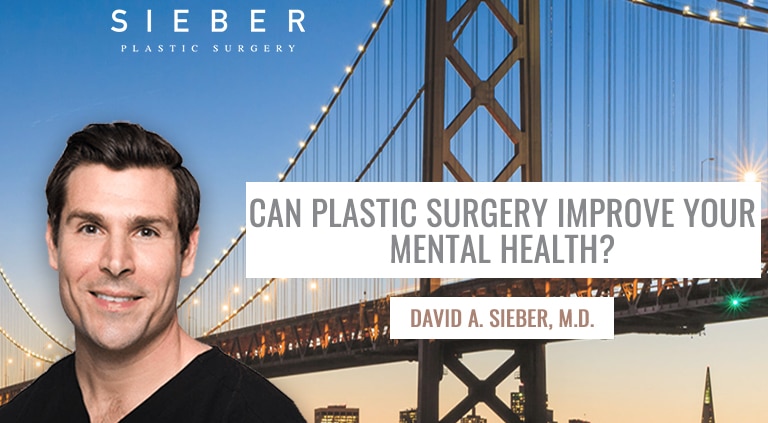Are There Negative Effects of Plastic Surgery on Mental Health?
Plastic surgery in the Bay Area has long been associated with physical appearance and beauty, but bad plastic surgery impact on mental health is often overlooked. While some may view cosmetic surgery as a frivolous pursuit of vanity, the truth is that many individuals seek it to address underlying psychological issues.
For those with disfigurements or injuries, cosmetic surgery can provide much-needed relief and help restore self-confidence.
Additionally, for individuals struggling with body dysmorphia or other body image or appearance-related mental health concerns, cosmetic surgery can serve as a tool for achieving a sense of self-acceptance and improving overall well-being.
The question remains: can the possible negative impacts of plastic surgery on mental health alleviate or counteract the psychological burdens associated with dissatisfaction with one’s appearance?
Table of Contents
THE COMPLEXITY OF MENTAL HEALTH AND PLASTIC SURGERY
First, we have to address the complexity of the problem. There are many variables to consider here, including:
- Our lack of understanding of mental health. It’s incredibly difficult to pin down what constitutes a mentally “healthy” individual. There are dozens of variables to consider, including depression, anxiety, body dysmorphia, social phobias, and overall happiness—so how should you measure these?
- And what if a person, after recovering from plastic surgery, experiences gains in one area while suffering even more in a different area? Is it fair to say they saw an improvement in mental health?
- The reality is, even our best experts still don’t have a firm grasp on the nuances of mental wellbeing.
- The relationship between attractiveness and happiness. It’s easy to assume that physically attractive people tend to be happier and mentally healthier, but the research seems to indicate otherwise.
- Merely being more attractive isn’t enough to give someone a mental health boost. Of course, what we see in many plastic surgery procedures isn’t necessarily about making someone more attractive; it’s making them feel more attractive. More on that later.
- The quality of the surgery. We’ve all seen examples of “botched” plastic surgeries that end up making someone appear unnatural, or worse than they did before. Certainly, the quality of the cosmetic procedure plays a role in whether plastic surgery has the power to improve your mental health.
BIG PICTURE: WELLBEING AFTER SURGERY

Those who underwent cosmetic surgery showed improvement in many different areas, including reduced social phobias, reduced anxiety, lower levels of depression, less body dysmorphia, higher feelings of attractiveness, higher self-efficacy, higher self-esteem, better life satisfaction, and self-reported feelings of quality of life.
It’s important to note that most of these participants were dissatisfied with a particular feature of their body, and underwent reconstructive surgery, to correct that feature.
In fact, multiple studies seem to confirm that people undergoing surgery tend to be “happier” after the procedure. One follow-up attempted to dig deeper into the issue, finding that other variables can play a role in whether or not a patient shows improvement.
For example, patients with unrealistic expectations tend to show fewer positive outcomes than those with appropriate expectations. It is important for cosmetic surgery patients who are undergoing cosmetic surgery to discuss with their surgeon the expected outcomes and have a realistic approach to what they can expect for life after surgery.
Plastic surgeons know that when a patient seeking a cosmetic surgery approaches surgery with a clear mind a a realistic set of expectations for recovery, they are on a good track toward a successful outcome.
Additionally, patients with extreme body dysmorphia may never feel truly satisfied with their bodies, no matter how many surgeries they undergo. This is important to note because those of poorer mental health find that surgery does not fill the role of other forms of treatment that may be available to them.
IS PLASTIC SURGERY LINKED TO DEPRESSION?
Postoperative depression entails numerous aftereffects following surgical interventions and extends beyond just cosmetic procedures. Individuals who undergo surgeries such as appendix or heart removal might encounter distressing emotional responses. There is little to suggest that plastic surgery results in postoperative depression more than other surgeries.
COSMETIC SURGERY VS. MENTAL HEALTH TREATMENT
Of course, it would be irresponsible to suggest that plastic surgery is a suitable treatment for things like anxiety, eating disorders, or body dysmorphia.
In the vast majority of cases, the appropriate course of action is to speak with a mental health professional. Plastic surgeons always refer the appropriate patients, whether they be suffering from eating disorders, mental health problems, or other mental disorders, to the appropriate doctors in this scenario.
In many cases, cognitive behavioral therapy can help patients better cope with their feelings and think in a healthier way. In other cases, a prescription medication may be better suited to alleviate symptoms of mental disorders.
KEY FACTORS FOR MENTAL HEALTH IMPROVEMENT
If you’re interested in improving your own mental wellbeing with plastic surgery procedures like breast implants, there are a few things you need in order to be successful:
- Mental health issues tied to physical dissatisfaction. Just getting a facelift or a breast augmentation is not going to make you happier and reduce your anxiety. Instead, your mental health issues have to be rooted in some kind of physical dissatisfaction.
- For example, you may feel lower life satisfaction or lower self-esteem because you hate the way your nose looks; in these cases, plastic surgery is addressing a root cause. If the root cause is something that cosmetic surgery can’t reach, cosmetic surgery isn’t going to help.
- Realistic expectations. It’s also important to have realistic expectations about what surgery can do for you. While cosmetic procedures can sometimes provide extreme results, in most cases, they’re better suited for subtle alterations.
- If your expectations are too high or aren’t grounded, you could end up disappointed.
- Successful surgical procedures. If your surgery is done poorly, you may end up feeling worse than you did before you got the procedure.
- It’s important to do your research and work with a plastic surgeon trained and experienced enough to almost guarantee you a successful procedure like nose job, cheek implants, nose job revision, neck liposuction or chin reduction.
- Additional support. In most cases, people see better mental health results after plastic surgeries if they’re also benefitting from additional modes of support.
- They’re going to therapy. They’re taking medication (if recommended by a professional). They’re talking to friends and family members openly. The combination of these factors can have a much more powerful effect than just one.
IS THERE A SUCH THING AS TOO MUCH PLASTIC SURGERY?

If someone undergoes too many cosmetic procedures or becomes obsessed with achieving an unrealistic standard of beauty, they may develop body dysmorphia, a mental health disorder where an individual becomes preoccupied with perceived flaws in their appearance.
This can lead to a cycle of repeatedly seeking out more procedures, which can have negative physical and mental health consequences.
Additionally, excessive cosmetic surgery procedures can result in physical complications such as scarring, infection, and nerve damage.
It is crucial to have realistic expectations and to work with a qualified and experienced plastic surgeon who can provide guidance and help ensure the safety of the procedures.
In summary, while plastic surgeries procedures can offer benefits, it is important that cosmetic surgery patients approach it with moderation and a focus on improving overall well-being rather than seeking perfection at any cost.
NEGATIVE EFFECTS OF PLASTIC SURGERY ON MENTAL HEALTH
While plastic surgeries can improve an individual’s physical appearance, it is important to be aware that it can also have negative effects on mental health.
One of the potential negative effects of cosmetic procedures on mental health is the development of body dysmorphic disorder (BDD).
Body dysmorphic disorder is a mental health condition characterized by a preoccupation with perceived flaws in appearance.
Individuals with BDD may become obsessive about perceived flaws, leading to feelings of anxiety, depression, and social withdrawal. This can lead to a vicious cycle of surgery patients undergoing more procedures to fix perceived flaws, which can worsen the BDD symptoms.
Plastic surgeries can also contribute to unrealistic expectations of beauty, leading to feelings of disappointment and dissatisfaction with the outcome of the cosmetic procedure itself. This can lead to negative impacts on self-esteem, depression, and anxiety.
Another negative impact of cosmetic surgeries on mental health can be experienced by those who have undergone multiple procedures in a short period of time, leading to physical discomfort and prolonged recovery time.
The stress of cosmetic surgery and recovery can lead to anxiety and depression, and prolonged physical discomfort can have a negative impact on an individual’s overall well-being.
It is important to approach cosmetic surgeries with realistic expectations and to work with a qualified and experienced plastic surgeon who can provide guidance and help ensure the safety of the procedures.
Additionally, it is crucial to have a strong support system and to prioritize mental health and self-care before and after undergoing surgeries.
WHAT MENTAL ILLNESS IS ASSOCIATED WITH SURGERY?
The mental illness most commonly associated with plastic surgeries is body dysmorphic disorder (BDD). Body dysmorphic disorder is a mental health condition that involves a preoccupation with perceived flaws or defects in one’s appearance.
People with body dysmorphic disorder may focus excessively on one or more perceived flaws, often spending significant time checking or grooming themselves, and may experience significant distress or anxiety as a result.
Individuals with body dysmorphic disorder may seek out plastic surgeries as a way to address their perceived flaws, but may also be dissatisfied with the results and may continue to seek additional procedures in an attempt to correct the perceived imperfections.
This cycle of patients seeking cosmetic surgery and more procedures can lead to excessive plastic surgeries, and can exacerbate the symptoms of body dysmorphic disorder.
It is important for plastic surgeons to screen for body dysmorphic disorder prior to performing any cosmetic procedures, and to refer patients with suspected BDD to a mental health professional for evaluation and treatment.
People with body dysmorphic disorder may benefit from psychological interventions such as cognitive-behavioral therapy and medication, which can help them manage their symptoms and reduce the likelihood of excessive surgery.
Plastic surgeons are aware of the signs to look out for when consulting a patient. At the top of mind for all surgeons is the pursuit of positive psychological and psychosocial outcomes.
THE BOTTOM LINE
So what are the effects of plastic surgery on mental health? The key takeaway here is that, while cosmetic surgery research shouldn’t be considered as a total substitute for other modes of mental health treatment, most people who undergo plastic surgery procedures like breast augmentation tend to feel happier and exhibit fewer signs of negative mental health after their procedures.
In other words, cosmetic surgery can improve your mental health under the right conditions. There are positive effects of plastic surgery on mental health.
If you’d like to speak with a surgeon directly about what kind of procedure may be right for you, or if you’re not sure what your options are, contact us to schedule a free consultation today!
We’ll discuss the surgical options like breast implants, chin reduction, lip injection or other procedures available to you, and set expectations for how you might move forward.




